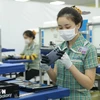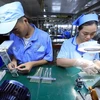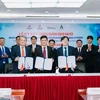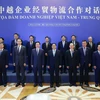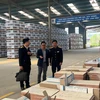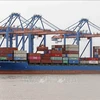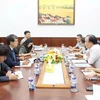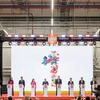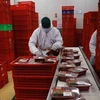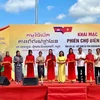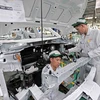The Vietnam-Eurasian Economic Union Free Trade Agreement signed on May 29 is forecast to offer both ample opportunities and tough challenges to Vietnamese businesses.
According to the agreement, Vietnam will have great opportunities to sell strong products to the Eurasian Economic Union (EAEU), encompassing Russia, Belarus, Kazakhstan, Armenia and Kyrgyzstan. Aquatic products, garments and leather will be the key beneficiaries of the deal as they enjoy a zero percent tariff.
Dang Phuong Dung, Vice President and Secretary General of the Vietnam Textile Association (VITAS) felt upbeat about Vietnamese textile and garments’ market share in the Union, predicting that two-way garment trade will grow by 50 percent the first year of the agreement’s implementation and 20 percent over the next five years.
Vietnam will be the Union’s fourth provider of apparel from the current eighth place, she said.
Thanks to the signing of free trade deals between Vietnam and the Republic of Korea, the EAEU and the EU, a wave of foreign capital has flown into the garment and textile sector from the outset of this year, broadening opportunities for Vietnamese products.
However, Dung said that enterprises need to make efforts to increase their competitiveness, a move to leverage potential spurred by the signed agreements.
On the contrary, the deal will bring major competition to the Vietnamese steel sector as Russian steel has low production costs and high quality, said Nguyen Van Sua, Vice Chairman of the Vietnam Steel Association.
Each year, Russia produces 70 million tonnes of steel using advanced technology. Each tonne of steel billet produced in Russia costs 50 kilowatt hours of power, while Vietnam consumes 10 times higher to produce the same.
Furthermore, most Vietnamese steel enterprises are small-scale operations and lack advanced technology.
Sua suggested that Vietnamese enterprises need to expand their knowledge about international trade to protect their production, and the Government should deploy legal trade tools to protect and support domestic steel production.
Meanwhile, a representative from the association said steel businesses should increase their competitiveness capacity for effective production and fight trade fraud.-VNA
According to the agreement, Vietnam will have great opportunities to sell strong products to the Eurasian Economic Union (EAEU), encompassing Russia, Belarus, Kazakhstan, Armenia and Kyrgyzstan. Aquatic products, garments and leather will be the key beneficiaries of the deal as they enjoy a zero percent tariff.
Dang Phuong Dung, Vice President and Secretary General of the Vietnam Textile Association (VITAS) felt upbeat about Vietnamese textile and garments’ market share in the Union, predicting that two-way garment trade will grow by 50 percent the first year of the agreement’s implementation and 20 percent over the next five years.
Vietnam will be the Union’s fourth provider of apparel from the current eighth place, she said.
Thanks to the signing of free trade deals between Vietnam and the Republic of Korea, the EAEU and the EU, a wave of foreign capital has flown into the garment and textile sector from the outset of this year, broadening opportunities for Vietnamese products.
However, Dung said that enterprises need to make efforts to increase their competitiveness, a move to leverage potential spurred by the signed agreements.
On the contrary, the deal will bring major competition to the Vietnamese steel sector as Russian steel has low production costs and high quality, said Nguyen Van Sua, Vice Chairman of the Vietnam Steel Association.
Each year, Russia produces 70 million tonnes of steel using advanced technology. Each tonne of steel billet produced in Russia costs 50 kilowatt hours of power, while Vietnam consumes 10 times higher to produce the same.
Furthermore, most Vietnamese steel enterprises are small-scale operations and lack advanced technology.
Sua suggested that Vietnamese enterprises need to expand their knowledge about international trade to protect their production, and the Government should deploy legal trade tools to protect and support domestic steel production.
Meanwhile, a representative from the association said steel businesses should increase their competitiveness capacity for effective production and fight trade fraud.-VNA
